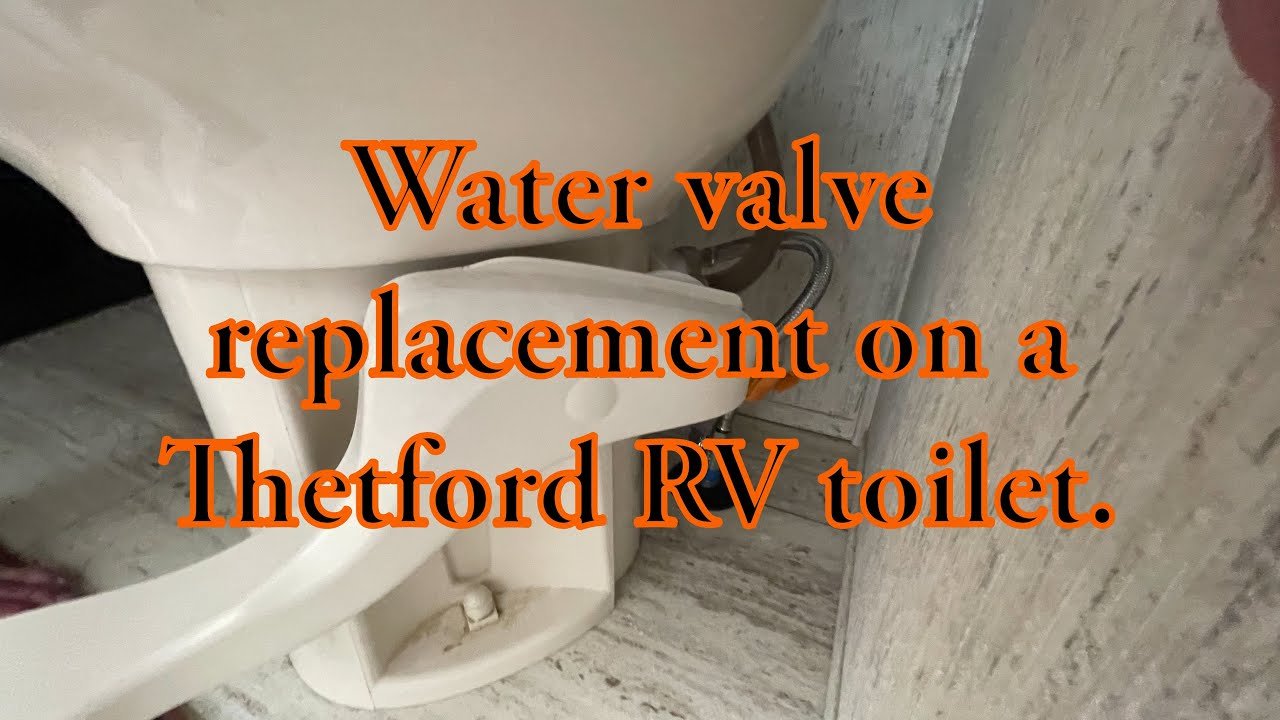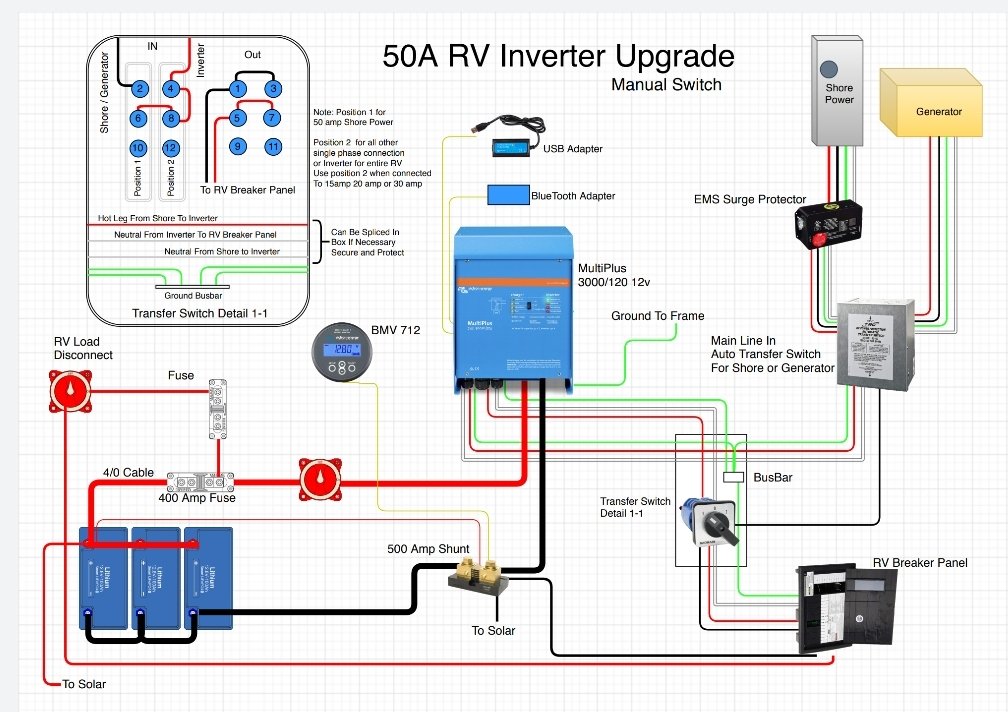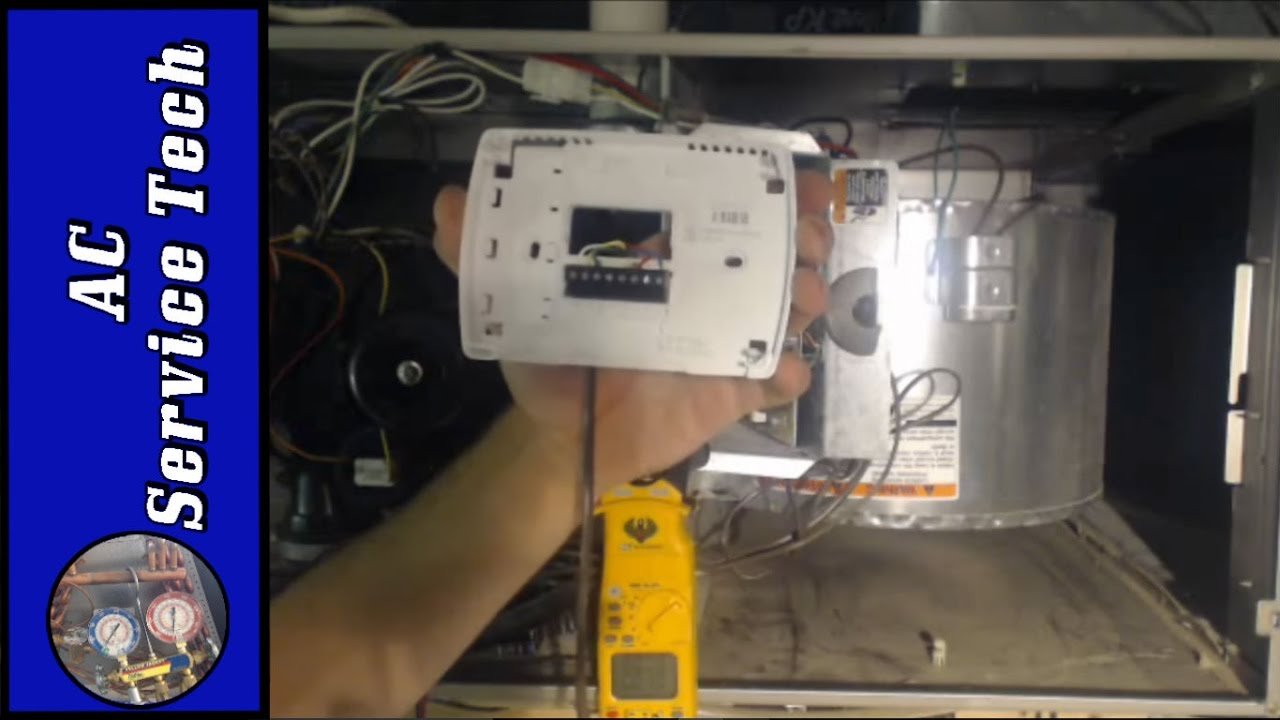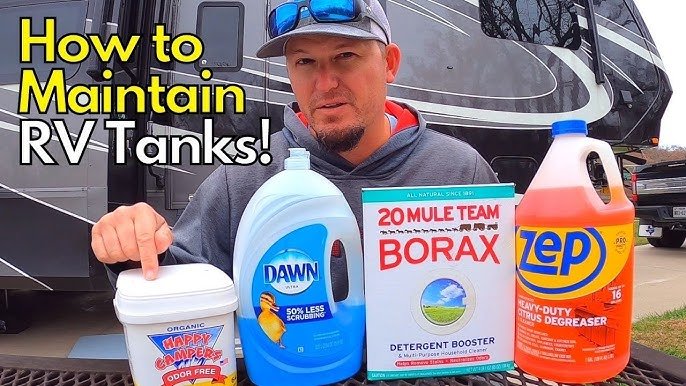Choosing the right wire size for a 50 amp RV plug is crucial. It ensures safety and optimal performance.
When dealing with electrical setups for RVs, it’s important to get the wire size right. Using the correct wire size prevents overheating and potential hazards. For a 50 amp RV plug, specific wire requirements must be met to handle the electrical load safely.
Understanding these requirements can save you from costly mistakes and ensure your RV’s electrical system runs smoothly. In this guide, we’ll explain the necessary wire size for a 50 amp RV plug. You’ll learn why this particular wire size is essential and how to choose the right one for your needs.
Introduction To 50 Amp Rv Plug
Choosing the right wire size for a 50 Amp RV plug is crucial for safety. Typically, 6-gauge wire is recommended for this purpose. This wire size ensures proper current flow and prevents overheating.
A 50 Amp RV plug is essential for many recreational vehicles. It provides a stable power source. This allows RVs to run multiple appliances simultaneously. Knowing the right wire size is crucial for safe operation.
Importance Of Proper Wiring
Using the correct wire size prevents overheating. It ensures your electrical system works efficiently. Incorrect wiring can lead to dangerous situations. Proper wiring extends the lifespan of your RV’s electrical system. It also ensures that all your devices work properly.
Common Applications
A 50 Amp RV plug powers air conditioners. It supports large appliances like refrigerators. It also charges batteries and powers entertainment systems. Campgrounds and RV parks often provide 50 Amp service. This allows RV owners to use their equipment without worry. “`
Understanding Electrical Current
Understanding electrical current is crucial for RV enthusiasts. It ensures safe and efficient operation of electrical systems. When it comes to selecting the right wire size for a 50 amp RV plug, you need to consider several factors. These include amperage, voltage, and wire type. Let’s dive into the basics to make an informed decision.
Basics Of Amperage
Amperage measures the flow of electrical current. It is expressed in amps. For a 50 amp RV plug, the wire must handle a 50 amp load. Using a wire that can’t handle this load is dangerous. It can cause overheating and even fires. Typically, a 6-gauge wire is recommended for a 50 amp RV plug. This ensures safety and efficiency.
Role Of Voltage
Voltage is the electrical pressure that pushes current through a wire. For RVs, the standard voltage is 120/240 volts. The wire size must match the voltage requirements. A 50 amp RV plug usually requires a dual voltage of 120/240 volts. This means the wire must handle both voltages effectively. Ensuring the wire is rated for these voltages is important.
Here’s a quick reference table for wire size and amperage:
| Wire Gauge | Amperage Rating |
|---|---|
| 14-gauge | 15 amps |
| 12-gauge | 20 amps |
| 10-gauge | 30 amps |
| 8-gauge | 40 amps |
| 6-gauge | 50 amps |
Selecting the right wire size is essential for safety. Always consult a professional electrician for advice. Understanding electrical current helps you make the best choice for your RV’s needs.
Choosing The Right Wire Size
Choosing the right wire size for a 50 amp RV plug is crucial. The correct wire size ensures safety and efficiency. This section will guide you through the essentials.
Factors To Consider
Several factors influence the choice of wire size. These include:
- Length of the wire run: Longer distances require thicker wires.
- Wire material: Copper and aluminum have different properties.
- Ambient temperature: Higher temperatures may necessitate larger wires.
Wire Gauge And Ampacity
Wire gauge refers to the thickness of the wire. Thicker wires have lower gauge numbers. The ampacity of a wire is the maximum current it can carry safely.
For a 50 amp RV plug, typically a 6-gauge copper wire is recommended for short runs. For aluminum wires, a 4-gauge wire is generally used. Refer to this table for a quick overview:
| Wire Material | Gauge | Ampacity |
|---|---|---|
| Copper | 6 | 55 Amps |
| Aluminum | 4 | 50 Amps |
It’s important to note that longer wire runs may require a gauge size larger. Always consult local electrical codes and guidelines for precise recommendations.
Types Of Wires For 50 Amp Rv Plug
Choosing the right wire size for your 50 amp RV plug is crucial. The wire size ensures safety and efficiency. Different types of wires are available for this purpose. Understanding these options can help you make the best choice.
Copper Vs. Aluminum
Copper wires are popular for their excellent conductivity. They are reliable and durable. Copper wires resist corrosion, making them ideal for various conditions.
Aluminum wires are lighter and more affordable. They are less conductive than copper. Therefore, they need a larger gauge to carry the same current. Aluminum wires also require special connectors to prevent corrosion.
Stranded Vs. Solid
Stranded wires consist of multiple small wires twisted together. They are flexible and easy to work with. Stranded wires are less likely to break from repeated bending.
Solid wires consist of a single, thick wire. They are more rigid and harder to bend. Solid wires are often used in permanent installations.
Both types have their benefits. Your choice depends on your specific needs and installation environment.
Installation Guidelines
Installing a 50 amp RV plug requires attention to detail and safety. Following the correct guidelines ensures a safe and functional installation. This section provides clear steps and necessary tools to make the process easy.
Tools And Materials Needed
Before starting the installation, gather all the necessary tools and materials. You will need:
- 50 amp RV plug
- 6-gauge wire
- Wire cutters
- Wire strippers
- Screwdrivers
- Voltage tester
- Electrical tape
- Conduit (if required)
Having these items ready will streamline the installation process.
Step-by-step Process
Follow these steps to install your 50 amp RV plug safely:
- Turn off the main power supply. This prevents electrical shocks.
- Mount the electrical box where you want the RV plug. Ensure it is secure.
- Run the 6-gauge wire from the breaker panel to the electrical box. Use conduit if necessary.
- Strip the wire ends using wire strippers. Leave enough exposed wire for connections.
- Connect the wires to the RV plug. Attach the black wire to the brass terminal, the white wire to the silver terminal, and the green wire to the ground terminal.
- Secure the plug to the electrical box using screws. Ensure it is tight and stable.
- Turn on the main power supply. Use a voltage tester to ensure the plug is working correctly.
- Wrap electrical tape around the connections for extra safety.
Your 50 amp RV plug is now ready for use. Follow these steps to ensure a successful installation.

Credit: www.pinterest.com
Safety Precautions
Ensuring safety while installing a 50 amp RV plug is crucial. It protects you and your property. By following these safety precautions, you can avoid common mistakes and ensure proper grounding.
Avoiding Common Mistakes
Using the correct wire size is vital. For a 50 amp RV plug, use a 6-gauge wire. Thinner wires can overheat. This can lead to fires. Always check the wire’s insulation. It should be intact and undamaged.
Do not overload the circuit. This can cause breakers to trip. Overloading can also damage appliances. Always follow the manufacturer’s instructions. They provide specific guidelines for safe installation.
Ensuring Proper Grounding
Proper grounding is essential. It protects against electrical shocks. Use a ground wire that matches the size of the power wires. For a 50 amp plug, a 6-gauge ground wire is recommended.
Connect the ground wire securely. It should attach to the ground terminal in the plug. Ensure the ground connection is tight. Loose connections can lead to hazards. Regularly check the grounding system. Make sure it is in good condition.
Testing And Troubleshooting
Testing and troubleshooting are crucial steps to ensure your 50 amp RV plug works safely. You need to check the wiring and connections to avoid potential issues. Using the right tools can make this process straightforward and efficient.
Using A Multimeter
A multimeter is an essential tool for testing electrical connections. First, set your multimeter to the voltage setting. Then, insert the probes into the plug’s slots. The multimeter should read around 240 volts. If the reading is lower, there may be a wiring issue. Check the connections and test again.
Identifying Potential Issues
Several issues can affect your 50 amp RV plug. Loose connections are a common problem. Tighten all screws and connections securely. Another issue could be damaged wires. Inspect the wires for any signs of wear or damage. Replace any damaged wires immediately to avoid hazards.
Sometimes, the problem may be with the RV’s internal wiring. Consult a professional if you suspect internal issues. Regular testing and maintenance can prevent most problems and ensure your RV plug is always ready for use.
Maintenance Tips
Maintaining your 50 amp RV plug is crucial. Proper care ensures safety and longevity. Follow these simple tips to keep your electrical system in top shape.
Regular Inspections
Inspect your RV plug regularly. Look for any signs of wear or damage. Check the connections. Make sure they are tight and secure. Loose connections can cause overheating and other issues.
Examine the wire for any cuts or abrasions. These can lead to dangerous situations. If you see any damage, replace the wire immediately.
Preventive Measures
Keep the plug and wire clean. Dirt and debris can cause poor connections. Wipe them down with a dry cloth. Avoid using water or harsh chemicals.
Store your RV plug and wire properly. Keep them away from extreme temperatures and moisture. Coil the wire neatly. This prevents kinks and tangles, which can damage the wire.
Use a surge protector. It safeguards your RV’s electrical system from voltage spikes. This simple device can prevent costly repairs.
Frequently Asked Questions
What Gauge Wire Is Needed For A 50 Amp Rv Plug?
For a 50 amp RV plug, you need a 6-gauge wire. This wire size ensures safe and efficient power delivery to your RV.
Can I Use 8-gauge Wire For A 50 Amp Rv?
No, 8-gauge wire is insufficient for a 50 amp RV. You should use a 6-gauge wire to handle the load safely.
Is Aluminum Wire Suitable For A 50 Amp Rv Plug?
Aluminum wire can be used but is less preferred. Copper wire is recommended for better conductivity and durability.
How Long Can A 50 Amp Rv Wire Run Be?
For a 50 amp RV plug, the wire should ideally not exceed 100 feet. Longer runs may require thicker wire to prevent voltage drop.
Conclusion
Choosing the right wire size for a 50 amp RV plug is crucial. Safety and efficiency depend on it. Always use a wire gauge that supports the load. Typically, a 6-gauge wire is recommended. This ensures your RV gets the power it needs.
It also prevents overheating and potential hazards. Consult a professional if unsure. It’s better to be safe than sorry. Your RV adventures will be more enjoyable with the right setup. Make informed decisions and enjoy your travels.






